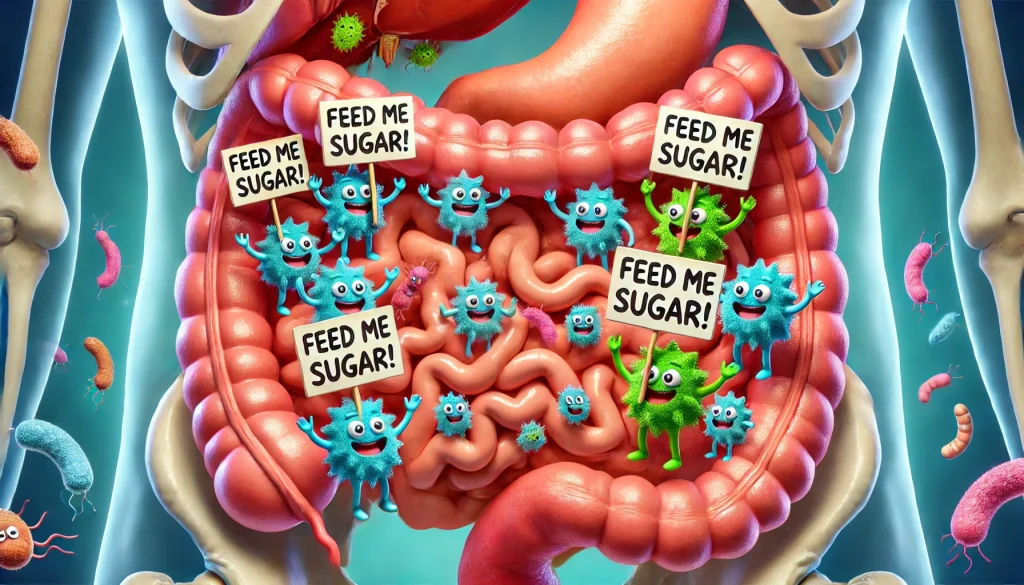This week we are talking about
The Potential Relationship between Tics/Tourette Syndrome and Gut Microbiome
👉🏻What this study says about gut bugs
👉🏻What is there a correlation between your gut and tics
👉🏻Do you really need a probiotic?
The Gut-Brain Connection: How Your Microbiome Could Be Influencing Tic Disorders
Listen up, tic warrior parents! If you’ve been searching high and low for answers, you might want to take a closer look at your kiddo’s gut. Yep, you read that right – the key to managing those pesky tics might just be hiding in their microbiome.
The Second Brain in Your Belly
Did you know that you have more bacteria strains in your gut than cells in your entire body? Mind-blowing, right? It’s like a whole universe of tiny critters, and they’ve got a lot to say.
In fact, for every one signal your brain sends to your gut, your gut sends a whopping 10 signals back. It’s no wonder some folks call the gut the “second brain”!
The Bossy Bacteria
These gut bacteria aren’t just along for the ride. They’re calling the shots! If you’ve got an overgrowth of certain strains (looking at you, Candida), you might find yourself craving sweets like nobody’s business. That’s because those sneaky microbes are demanding their favorite snack – sugar!
But it’s not just about food cravings. The latest research is showing that the balance of bacteria in your gut could be playing a role in tic disorders too.
The Tic-Gut Connection
A recent meta-analysis (that’s fancy science speak for a study of studies) found a potential link between Tourette’s syndrome and the gut microbiome. They zeroed in on two specific bacterial strains – Bacteroides and Ruminococcus – and found that folks with Tourette’s tended to have different levels compared to the control group.
Now, before you start chugging probiotic smoothies, hold up! It’s not quite that simple.
The Probiotic Pitfall
I know, I know. The internet is full of articles touting probiotics as the magic bullet for everything from belly woes to brain health. But when it comes to tic disorders, blindly popping probiotics could do more harm than good.
You see, kiddos with tics tend to have super sensitive guts. Throwing in a random probiotic without knowing what’s going on in there is like playing bacterial roulette. It could push their microbiome in the wrong direction and make those tics even worse!
The Poop Transplant Hype
Speaking of microbiome interventions, let’s talk about the elephant in the room – fecal transplants. A recent study got a lot of buzz for showing that fecal transplants could help alleviate tic severity in mice with Tourette’s-like symptoms.
But before you start Googling “where to buy poop,” pump the brakes. This study was done on mice, not humans. And even if it pans out in people, getting a fecal transplant isn’t exactly a walk in the park (or a walk to the bathroom, for that matter).
The Holistic Approach to Tic Disorders
So, if probiotics are a gamble and poop transplants are a pipe dream, what’s a tic parent to do? It’s time to zoom out and look at the big picture.
There are so many factors that can influence the gut-brain connection – diet, toxins, infections, stress, even the way your kiddo came into this world! C-section babies miss out on that crucial dose of bacteria from the birth canal, setting them up for microbiome mayhem down the line.
The key is to work with a practitioner who can help you connect the dots. Someone who won’t just throw supplements at the problem, but will take a deep dive into your child’s unique health history and create a personalized plan.
The Bottom Line
The gut-brain connection is real, and it could be the missing piece of the tic disorder puzzle. But fixing it isn’t a quick fix – it’s a journey.

